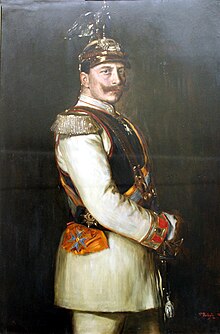
Back تنازل فيلهلم الثاني Arabic Abdankung Wilhelms II. German Παραίτηση του Γουλιέλμου Β΄ Greek Отречение Вильгельма II Russian 德意志皇帝威廉二世退位 Chinese

The abdication of Wilhelm II as German Emperor and King of Prussia was declared unilaterally by Chancellor Max von Baden at the height of the German revolution on 9 November 1918. It was formally affirmed by a written statement from Wilhelm on 28 November while he was in exile in Amerongen, the Netherlands. The abdication ended the House of Hohenzollern's 500-year rule over Prussia and its predecessor state, Brandenburg. With the loss of the monarchical legitimacy that was embodied by the emperor, the rulers of the twenty-two constituent states of the Empire also relinquished their royal titles and domains.
Wilhelm's abdication was triggered by Germany's impending defeat in World War I. In an attempt to obtain better terms from the Allies, a number of changes were made in the government and the constitution to partially democratise the Empire. The political changes were not enough to satisfy US President Woodrow Wilson, who was leading the attempt to broker an armistice. When it became clear that he wanted Wilhelm to abdicate, both the military and the government began to make various plans to save the monarchy through a regency or some other means after Wilhelm stepped down. The outbreak of the German revolution in the first days of November 1918 increased the pressure on Wilhelm to abdicate, but he continued to refuse. In order to calm the volatile situation in Berlin, Chancellor Baden, without Wilhelm's knowledge or approval, announced on 9 November that the Emperor had abdicated. Later that afternoon, Germany was proclaimed a republic, and Wilhelm went into exile in the Netherlands the next day. His official abdication came on 28 November. The 500-year-old Hohenzollern dynasty ended quietly, with almost no violence or fanfare.
A significant number of Germans, including many who considered themselves monarchists, saw Wilhelm's flight to the Netherlands as cowardice and desertion, a view that seriously undermined the dynasty's monarchist standing. In the military, the Supreme Army Command under Field Marshal Paul von Hindenburg quietly took over the emperor's role as "supreme warlord". Wilhelm hoped that the Nazis would return either him or one of his sons or grandsons to the throne, but Adolf Hitler had no interest in a restoration.
© MMXXIII Rich X Search. We shall prevail. All rights reserved. Rich X Search